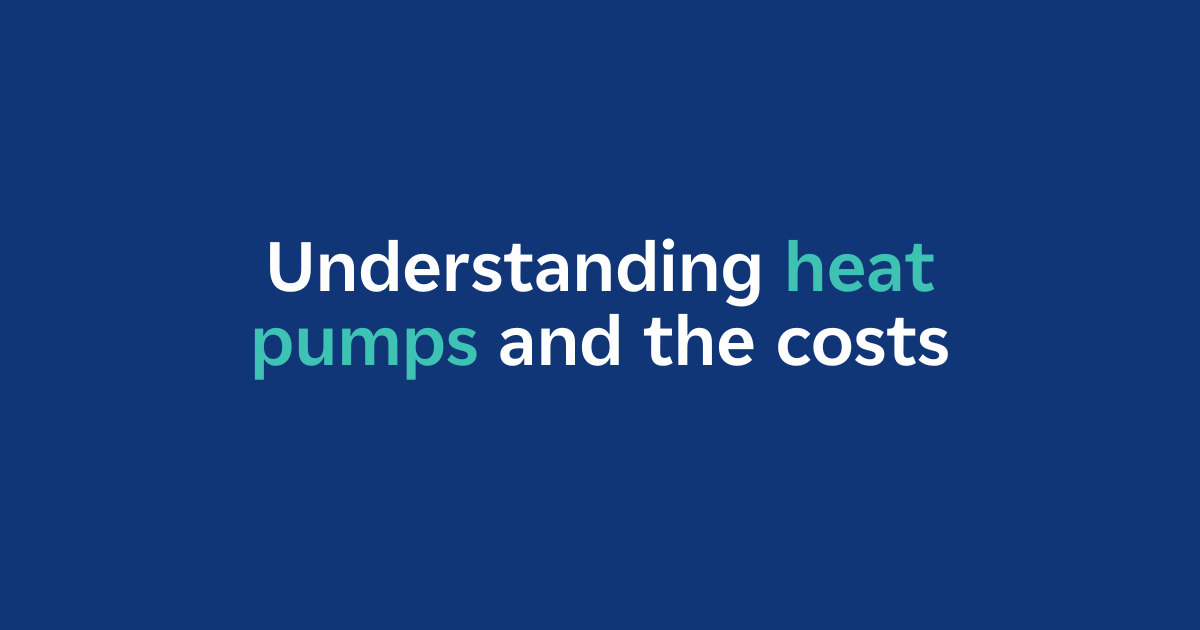Understanding the cost of heat pumps
What is a heat pump and how does it work?
Heat pumps are becoming one of the most talked-about alternatives to traditional boilers – and for good reason. Instead of burning fuel, they move existing heat from one place to another, using electricity. This makes them incredibly efficient, often delivering over three times more heat than the energy they consume.
So how does it all come together? Let’s break it down.
The basics
An air source heat pump (ASHP) works by capturing heat from the air outside your home – even on chilly days – and transferring heat indoors to provide heating or hot water. At the heart of the system are four key components:
- Evaporator– absorbs heat from the outside air into a special fluid (the refrigerant).
- Compressor– squeezes the refrigerant, raising its temperature.
- Condenser– passes that heat into your home’s heating or hot water system.
- Expansion valve– cools the refrigerant so the cycle can start all over again.
It’s a constant loop of capturing, boosting, and transferring heat – giving you warmth without burning fuel.

Heating and hot water options
Air source heat pumps can be set up in two main ways:
- Air-to-water systems– these connect to radiators, underfloor heating, and hot water cylinders, making them ideal for whole-home heating.
- Air-to-air systems– these work more like a reversible air conditioning unit, blowing warm or cool air directly into your rooms. That means they can keep your home comfortable in both summer and winter.
Heat pump operation in different seasons
In the winter, heat pumps pull heat from the outside air (yes, even when it’s cold outside!) and transfer it inside. This might seem counterintuitive, but even cold air contains heat energy that can be extracted.
Types of heat pumps
There are different types of heat pumps, including air source, ground source (geothermal), and water source heat pumps. Each type works slightly differently and may be more suitable depending on your geographic location and home setup. Air source heat pumps are the most common due to their relative ease of installation and affordability.
Why consider a heat pump?
Efficiency and cost savings
One of the biggest reasons homeowners switch to heat pumps is their efficiency. Heat pumps can generate over three times the amount of energy they consume, thanks to their ability to transfer rather than generate heat. This efficiency can translate into significant savings on your utility bills. But how much can you actually save?
Heat pumps can significantly reduce energy consumption. According to the Energy Saving Trust, if your home currently relies on electric heating such as storage heaters, switching to a heat pump could cut your energy bills by £1,200 per year. If you are replacing an old G-rated gas boiler, you could still see savings of £260 per year and for those using an LPG boiler, the savings could be £700 per year.
Environmental benefits
Heat pumps reduce your carbon footprint by using less energy compared to traditional heating systems such as gas boilers. They’re a great step towards a more sustainable lifestyle. By relying on electricity instead of fossil fuels, heat pumps can help decrease the overall demand for non-renewable energy sources.
The use of heat pumps also aligns with global efforts to reduce greenhouse gas emissions. The UK government currently offers the Boiler Upgrade Scheme for eligible homeowners who are looking to install an air source heat pump. This is part of the government’s strategy to meet its NetZero targets making heat pumps not only a smart financial choice but also an environmentally responsible one.
Improved home comfort
Beyond cost savings and environmental benefits, heat pumps improve your home comfort. They provide consistent temperatures all year round (even in winter) creating a more comfortable living environment for you and your family.
How much does a heat pump cost?
When considering a heat pump, it’s important to understand both the upfront and running costs.
Initial installation cost
The cost of installing a heat pump can vary and is based on several factors, including:
- The heat loss in your home
- The size of the heat pump required to adequately heat your home and hot water
- Your homes’ insulation
- Your current radiators and if any upgrades are required
- You and your families’ personal requirements
For the air source heat pump systems, we design and provide, a full site survey and technical assessment will be carried out prior to Install. We will calculate the heat loss on your property and design a system specifically for your home and your needs.
The average cost of installing a heat pump can range from £6,000 to £13,000 depending on the above factors. However, this does not include the Boiler Upgrade Scheme grant of £7.5K which, for eligible homeowners, will reduce the cost substantially. At EDF Heat Pumps, we also offer flexible finance options with affordable monthly payments to help with the air source heat pump installation cost.
Heat pump running costs
The running cost of a heat pump is where you could see the real savings. To make the most of your air source heat pump, you could consider switching to a dedicated heat pump tariff such as those offered by colleagues at EDF. A dedicated heat pump tariff could save you up to £351 a year (1)
The best way to make the most of your air source heat pump is to run it efficiently. Your installer will carry out a full handover with you so you’re happy with the set up and how the controls work. When people ask “why is my air source heat pump expensive to run?” it is often due to a bad installation or because the system is not being used in the most efficient way.
How much electricity does an air source heat pump use?
The electricity an air source heat pump (ASHP) uses depends on:
The size of your home (larger homes need more heating).
Your home’s insulation (good insulation means less heat loss, so the pump runs less often).
Your heating demand (how warm you like your home, how much hot water you use).
The efficiency of the heat pump (measured as the Coefficient of Performance, or COP).
As a rule of thumb: A typical UK home needs around 8,000–12,000 kWh of heat per year. With a heat pump efficiency of about 300% (COP of 3), that means it only needs 2,500–4,000 kWh of electricity per year to cover that demand.
For comparison, a gas boiler in the same home would use 12,000 kWh of gas. The key difference is that electricity is getting greener each year as the UK adds more renewables, so running a heat pump reduces your carbon footprint significantly. So, is a heat pump cheaper than gas? The answer is, it can be when paired with a dedicated heat pump tariff alongside a well-designed system. For many people right now, the cost of running your air source heat pump should be the same, and therefore no more expensive than running your gas boiler
Long-term savings
While the initial investment might be high, the long-term savings on your energy bills could be significant.
Over the lifespan of a heat pump, which can be 15-20 years, the reduction in energy costs can offset the initial expense, making it a cost-effective solution in the long run.
Heat pump vs gas boiler
Many people wonder if a heat pump is cheaper than a gas boiler. While gas boilers might have lower upfront costs, heat pumps generally win in terms of efficiency and long-term savings. The running costs of a heat pump can be lower than those of a gas boiler, especially when paired with a dedicated heat pump tariff.
For UK homeowners, the key difference between an air source heat pump and a gas boiler lies in efficiency and sustainability. A modern gas boiler is typically around 90% efficient, meaning it wastes some energy as heat escapes during the combustion process. By contrast, an air source heat pump doesn’t burn fuel at all – it simply moves heat from the outside air into your home, often achieving efficiencies of over 300%. That means for every unit of electricity used, you can get up to three units of heat.
While a boiler gives you instant hot water on demand, a heat pump will need space indoors for a hot water cylinder as well as space outside for the external unit. Switching to a heat pump will cut reliance on fossil fuels, lower your carbon footprint, and reduce long-term running costs – especially as the UK shifts towards renewable electricity and away from natural gas.
Comparing efficiencies and costs
Gas boilers, while effective, often operate at efficiencies ranging from 70% to 90%. In contrast, heat pumps can achieve efficiencies of up to 300%. This is because they move heat rather than generate it.
Common questions
Homeowners often worry about the running costs of heat pumps. While the initial installation cost can be significant, the long-term savings on energy bills often outweigh these costs.
Are heat pumps expensive to run?
For UK households, whether a heat pump is expensive to run really depends on your home and how your heating system is set up. As we’ve discussed, heat pumps are far more efficient than gas boilers, delivering around three units of heat for every unit of electricity they use.
Because electricity in the UK currently costs about three to four times more per unit than gas, the savings aren’t always clear-cut. In a well-insulated home with correctly sized radiators or underfloor heating, a heat pump could save you money, especially when coupled with a dedicated heat pump tariff. It should even be cheaper than your old G-rated gas boiler.
Why is my air source heat pump expensive to run?
If you notice your heat pump is costly to run, it could be due to several factors:
- Electricity vs gas prices
In the UK, electricity is about 3 – 4 times more expensive per unit (kWh) than gas.
Even though your heat pump is up to 3 times more efficient than a boiler, higher electricity prices could cancel out some of those savings.
- Insulation and heat loss
Heat pumps work well in well insulated homes, if you have not made improvements to your home insulation, you could be missing out on potential savings
If your home loses heat quickly (through old windows, thin walls, or poor loft insulation), your heat pump might have to work harder, using more electricity.
- System design and installation
If your radiators are too small or without a large enough surface area, the system may not get your home up to the temperature you require.
Your system should be designed specifically for your home and needs.
- Flow temperature settings
Heat pumps are most efficient when running at lower flow temperatures
If you try and run your heat pump at the same flow temperature as your old gas boiler, it could be a lot more expensive to run
- Hot water demand
If your household uses lots of hot water at once (baths, power showers, etc.), the system may switch on its immersion heater, which is more expensive to run.
Maximising efficiency
To maximise the efficiency of your heat pump, you could also consider combining it with other energy-saving measures such as solar panels and energy storage batteries.
Conclusion: is a heat pump right for you?
- Research your installer to find the one who will design the best and most efficient system for your home and needs.
- Shop around and get more than one quote for your system to decide which is best for you.
- Ask your installer about the Boiler Upgrade Scheme and see if you could benefit from the £7.5k government grant
- Look at getting a dedicated heat pump tariff to help with heat pump running costs
- Ensure you understand your new heat pump, so it runs efficiently all year round.
(1) A typical customer can save £351 per year versus the current single-rate price cap tariff. This is based on the following.
£164 of savings are based on a customer using Ofgem’s typical domestic consumption of 2700 kWh electricity and with heating provided by an air source heat pump with a coefficient of performance (CoP) of 3.1 providing equivalent heat to that from a 94% gas boiler using 11,500 kWh of gas. A further £187 of savings based on 0p per day electricity standing charge based on the Q2 Ofgem price cap using a regional average. Total saving of £164 + £187 = £351.



